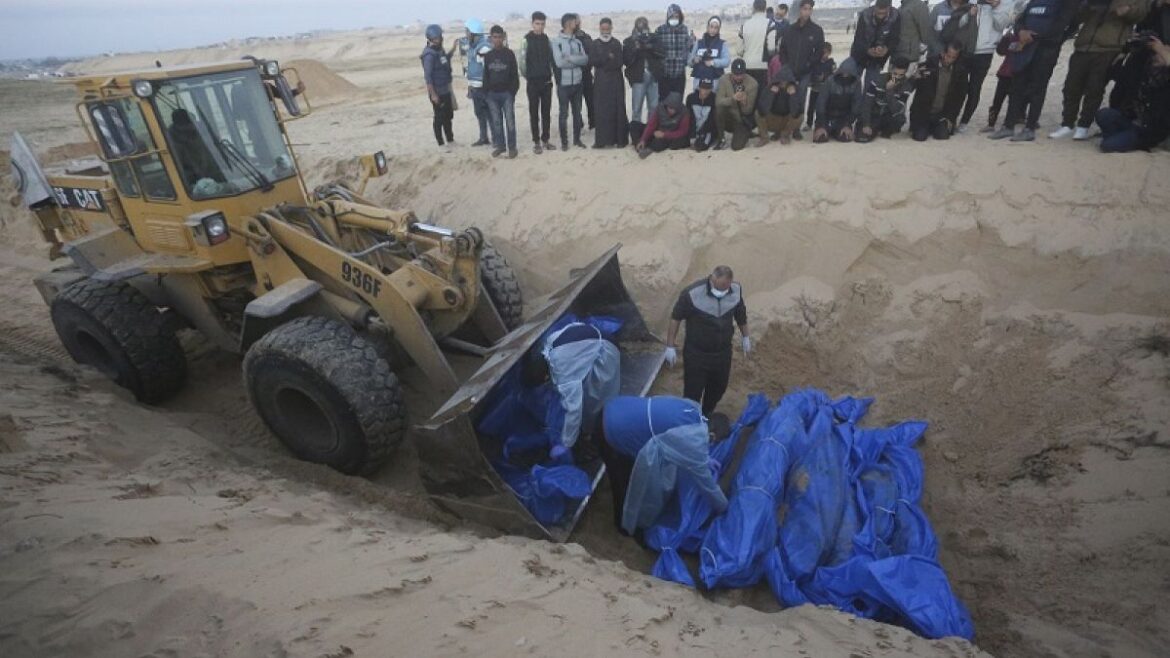The Israeli army is intensifying its strikes in the Palestinian enclave where the death toll is increasing day by day. During the last 24 hours, 241 Palestinian civilians have been killed in Israeli bombings.
The Israeli army is intensifying strikes on the Gaza Strip this Wednesday as part of its operation against Hamas which it believes could last for “many more months” despite serious humanitarian concerns.
In the Palestinian enclave, Israeli forces are “fighting in Khan Younes” (south) and “extending” their operations in camps in the center, army spokesperson Daniel Hagari said Tuesday evening.
The army issued an evacuation order to residents of the al-Bureij camp (center) and its surroundings. Some had already fled to Rafah, where they arrived with their luggage piled on the roof of their cars, according to AFP.
241 people were killed in the last 24 hours, the Hamas health ministry said Tuesday. Bodies of Palestinians were transported in a truck to a mass grave in Rafah where they were buried, according to an AFP journalist on site.
“We received a container containing a large number of martyrs. Some were complete bodies, while others were human remains,” lamented Marwan al-Hams, head of the health emergency committee in Rafah.
Israeli military retaliatory operations in the Gaza Strip left 20,915 dead and 54,918 injured, according to the Hamas Ministry of Health.
The UN High Commissioner for Human Rights once again said it was “deeply concerned about the continued Israeli bombing of central Gaza” and called for a distinction to be made” between civilians and combatants.
The United Nations organizes humanitarian aid
According to the UN, 85% of Gaza’s 2.4 million residents have been displaced by the war, and the humanitarian situation in the territory remains critical with famine looming and most hospitals out of service.
After last week’s adoption of a Security Council resolution demanding “large-scale” delivery of aid, the UN on Tuesday appointed an outgoing Dutch minister, Sigrid Kaag, as coordinator for humanitarian aid. in Gaza.
The Palestinian Red Crescent said it received 41 trucks of humanitarian aid and seven new ambulances via the Rafah border crossing on Tuesday, which remains well below needs according to the World Health Organization.
France said on Tuesday it was “gravely concerned” about the intensification and prolongation of the fighting and called “strongly” for “an immediate truce leading to a ceasefire”.
The Emir of Qatar Sheikh Tamim bin Hamad al-Thani, whose country had led mediation which allowed a truce at the end of November, spoke overnight with US President Joe Biden about the situation.
The two leaders discussed the necessary efforts “to calm the situation and achieve a permanent ceasefire,” Qatari diplomacy said in a statement.
In Washington, the White House spoke of discussions for the “liberation” of hostages held by Hamas, including “American citizens”, and to facilitate the delivery of humanitarian aid.
Israeli Strategic Affairs Minister Ron Dermer spoke with White House National Security Advisor Jake Sullivan about the release of hostages, a “different phase” of the war, more targeted against leaders of Hamas, and the deployment of aid to Gaza.
At the end of November, a one-week truce allowed the release of 105 hostages against 240 Palestinian prisoners, and the entry into Gaza of a large volume of aid.
But the efforts of mediators, especially Egyptian and Qatari, have so far not made it possible to achieve a new humanitarian pause.
Fear of conflict flaring up
Fears of an extension of the conflict are increasing, particularly through the action of groups close to Iran such as Hezbollah in Lebanon or the Houthis in Yemen, with Tehran supporting Hamas.
In the occupied West Bank, an Israeli raid early Wednesday left six people dead and many injured in the Tulkarem area, according to the Palestinian Health Ministry.
On the Israeli-Lebanese border, Israeli soldiers were injured Tuesday in Hezbollah fire while the Houthi rebels claimed responsibility for a drone attack against a ship in the Red Sea and a missile strike towards Israel which was intercepted.
The Al-Qahera News television channel said that “a flying object was shot down two kilometers off the coast of Dahab”, an Egyptian seaside town located 150 kilometers south of the border with Israel.
The American army, which patrols the Red Sea to protect maritime traffic in particular from attacks by the Houthis, for its part announced that it had destroyed twelve drones and five missiles fired by these rebels on Tuesday.
Attacks attributed to pro-Iranian groups against American troops have also increased in Iraq and Syria. In response, the United States struck three sites used by pro-Iranian groups in Iraq, killing one person.
These incidents come just after Tehran accused Israel of killing one of its senior officers, Razi Mousavi, in a strike in Syria, and promised to avenge his death.



